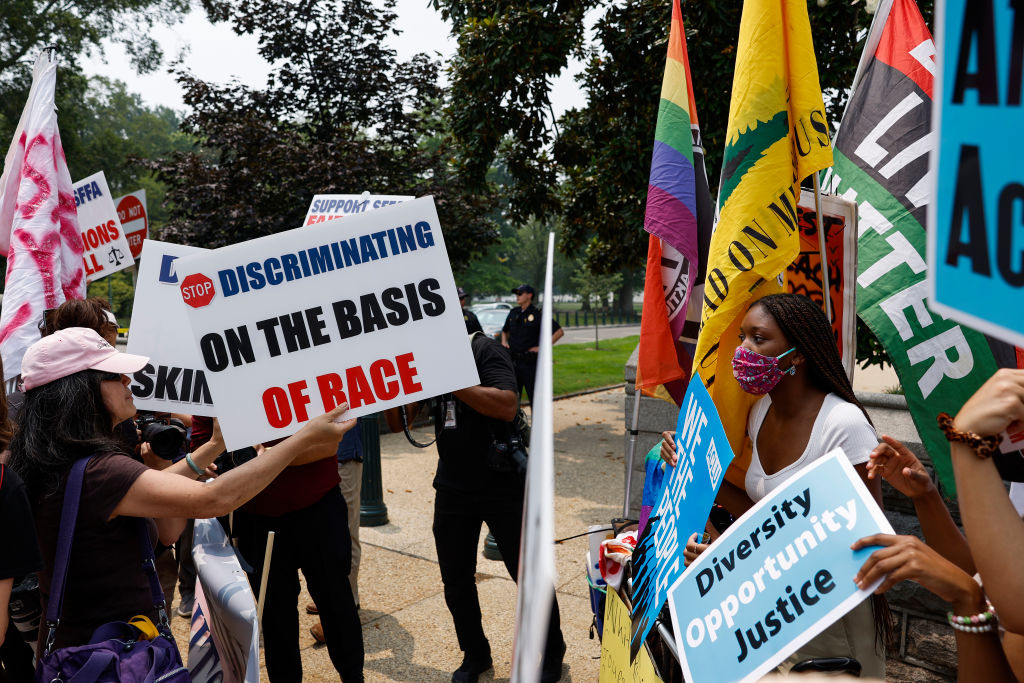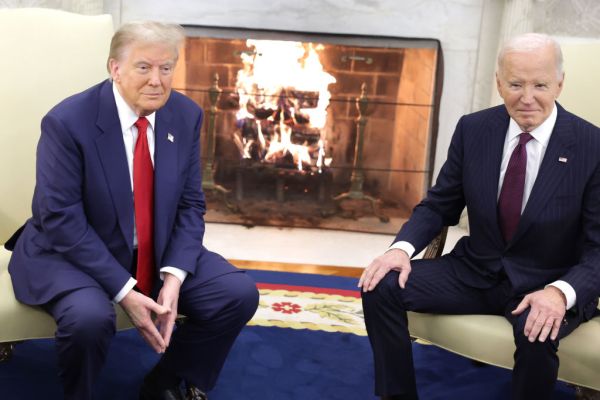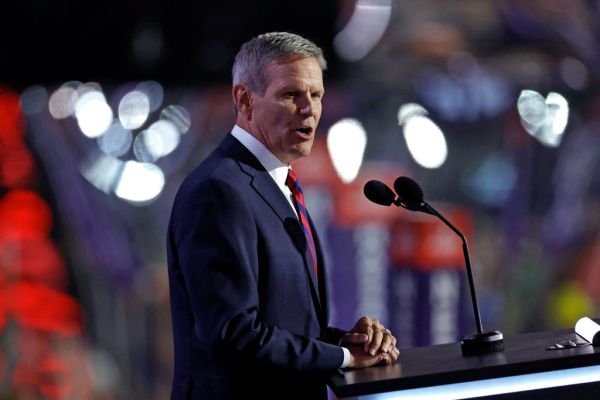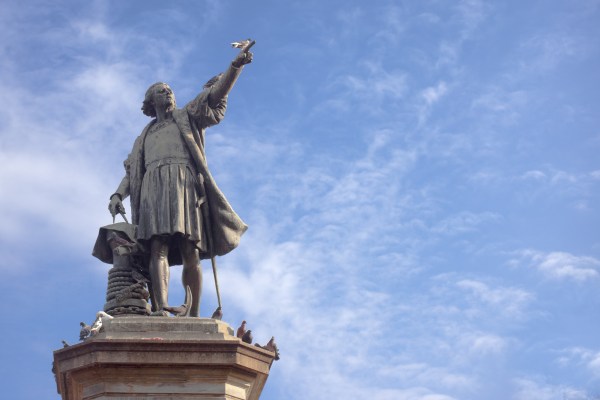Happy Friday! The band Fall Out Boy released a cover of Billy Joel’s “We Didn’t Start the Fire” with lyrics updated for the present. Any list that includes Spongebob alongside Kim Jong Un is bound to be controversial, but we approve—they made sure to mention the Cubs’ World Series win.
Quick Hits: Today’s Top Stories
- Federal Reserve Chair Jerome Powell suggested Thursday back-to-back rate hikes were possible at future Fed meetings after the central bankers declined to raise interest rates in June. “A strong majority of committee participants expect that it will be appropriate to raise interest rates two or more times by the end of the year,” he said at an event in Spain. On Wednesday, the Fed released the results of its annual bank stress test, which simulates recession scenarios to assess the resilience of financial institutions with more than $250 billion in assets. All 23 banks included in the exercise passed, but midsized lenders—like the failed Silicon Valley Bank and Signature Bank—weren’t evaluated.
- The Wall Street Journal reported Wednesday the Chinese spy balloon that crossed the United States in February used commercially available, U.S.-made technology to surveil Americans. U.S. intelligence agencies have analyzed the debris from the balloon—shot down off the coast of South Carolina—and determined the craft was in fact used for spying, noting the presence of more specialized Chinese equipment in addition to the American tech. It’s unclear whether the balloon was able to transmit information back to China.
- Israeli Prime Minister Benjamin Netanyahu told the Wall Street Journal Thursday he will drop the piece of his controversial judicial reform agenda that would have empowered the Israeli parliament to overturn Supreme Court decisions. The original judicial reform plan sparked widespread protests and international criticism earlier this year, prompting Netanyahu to pause the effort. The prime minister plans to now move forward with the revised legislation.
- Former Vice President Mike Pence made a surprise visit to Ukraine on Thursday, becoming the first GOP presidential candidate to meet with Ukrainian President Volodymyr Zelensky since joining the race. Pence visited several Ukrainian cities, including Bucha, the site of significant civilian deaths at the hands of the Russian army.
- Canada’s wildfire season—which has seen 20 million acres of land burned in roughly 3,000 fires since the beginning of the year and blanketed U.S. and Canadian cities in a smoky haze—is officially the worst on record. There are currently 483 wildfires burning across Canada, 250 of which are considered out of control. The previous record was set in 1989 with a far larger number of blazes but of much smaller size than this season’s fires.
- Hunter Biden settled his Arkansas child support case, according to a court filing released Thursday. The president’s son was ordered in 2020 to pay $20,000 a month in child support for a daughter he initially denied was his, but he reopened the case in an effort to reduce the payments. The filing redacted how much Biden will now pay, but his daughter will receive some of his paintings as part of the agreement.
- A Florida jury on Thursday acquitted Scot Peterson, the former school resource officer accused of failing to intervene during the 2018 shooting at Marjory Stoneman Douglas High School in Parkland, Florida, that killed 17 people. The jury found him not guilty of seven counts of felony child neglect, three counts of culpable negligence, and one count of perjury.
SCOTUS Rules Against Race-Based College Admissions

The Supreme Court tends to save its most controversial rulings of the term for last, and yesterday we finally got the decision we’ve all been waiting for: Abitron Austria GmbH v. Hetronic International, Inc.
What—you’re not following the extraterritorial trademark infringement showdown of the century? Well then let’s discuss SCOTUS effectively ending affirmative action for college admissions instead.
Combining two similar cases into one, justices were tasked with determining whether the race-based admissions policies at Harvard University and the University of North Carolina violate Title VI of the Civil Rights Act and the 14th Amendment’s equal protection clause. Writing for a 6-3 majority split along ideological lines, Chief Justice John Roberts concluded that they did, and that giving some students a race-based boost necessarily discriminates against others in the “zero-sum” world of admissions to highly selective colleges and universities.
Schools like Harvard and UNC—which receive far more applications than they have slots available—say they consider a number of factors besides grades and test scores in their admissions process and that including race among them is necessary to produce diverse student bodies that improve all students’ educational experiences. Backed by anti-affirmative action activist Ed Blum, Students for Fair Admissions (SFFA) argued the schools tipped the scales against Asian applicants in their quest to advance other minority groups.
While both schools faced accusations of sandbagging high-achieving Asian applicants, details about Harvard’s process—revealed by SFFA’s court filings—were particularly offensive. The school learned in 2013, for instance, that its “personality score,” ostensibly measuring traits like likability and courage, consistently rated Asian applicants lower—but did nothing about it. Asian students also needed a higher SAT score than students of other races to be considered for a recruitment letter correlated with higher rates of admissions, and a Harvard admissions officer laughed along with a government regulator’s email joking about the school having higher standards for Asian applicants.
Previous Supreme Court rulings in 1978, 2003, and 2016 prohibited explicit racial admissions quotas but permitted the consideration of race “as one factor among many, in an effort to assemble a student body that is diverse in ways broader than race.” Roberts insisted in Thursday’s ruling that these precedents came with restrictions—the affirmative action scheme must comply with strict scrutiny, never use race as a stereotype or negative, and eventually end. Harvard and UNC’s programs, Roberts wrote, “fail each of these criteria” and therefore violate the equal protection clause of the 14th Amendment.
Roberts was careful to specify, however, that Thursday’s ruling doesn’t ban students from including race in their applications—or universities from valuing an individual applicant’s experiences related to race. “Nothing in this opinion should be construed as prohibiting universities from considering an applicant’s discussion of how race affected his or her life,” he wrote, “be it through discrimination, inspiration, or otherwise.”
Harvard, it seems, plans to take him up on it, leaning on students’ discussion of race in their applications. The school released a statement Thursday making clear it would comply with the court’s decision but reiterating its commitment to a student body reflecting “multiple facets of human experience” and pledging to “preserve, consistent with the Court’s new precedent, our essential values.” But Roberts cautioned against setting up proxy systems that would violate the spirit of the ruling: “Universities may not simply establish through application essays or other means the regime we hold unlawful today.”
In a concurrence longer than the majority opinion, Justice Clarence Thomas—who has harbored frustrations for years about his Yale Law School classmates assuming he was an affirmative action beneficiary—agreed vehemently with Roberts. “It sees the universities’ admissions policies for what they are: rudderless, race-based preferences designed to ensure a particular racial mix in their entering classes,” Thomas wrote, arguing the schools couldn’t convincingly articulate compelling, measurable educational advantages to racial diversity. “UNC offers no reason why seeking a diverse society would not be equally supported by admitting individuals with diverse perspectives and backgrounds, rather than varying skin pigmentation.”
“Two discriminatory wrongs cannot make a right,” he added, arguing race-conscious admissions perpetuate new racial injustices in the quest to make up for old ones.
Americans are divided on the concept of “affirmative action,” but a majority seems to dislike the idea of race-based college admissions. A recent YouGov/CBS News poll found about 53 percent of respondents thought affirmative action programs in general should continue—but only 30 percent thought colleges should be allowed to consider race in admissions. A Pew Research Center survey from early June turned up similar results: 50 percent of respondents disapproved of selective colleges “considering race and ethnicity in admissions decisions,” compared to just 33 percent who approved.
For all the fuss the case has caused, the tangible effects of Thursday’s ruling will be relatively limited. Only about six in 10 graduating high school seniors go directly to college, and college enrollment plunged 8 percent from 2019 to 2022. For students who do continue their education, three of every five universities already didn’t consider race in their admissions decisions. Roberts also included an—at least temporary—exception to the ruling for military academies, noting that while Harvard and UNC didn’t communicate a sufficiently compelling reason for their programs, SCOTUS’ ruling doesn’t necessarily outlaw the Defense Department’s consideration of race in academy admissions to ensure a diverse officer corps.
For the prestigious schools most affected, though, the ruling could have immediate effects on student body makeup: Even SFFA predicted Harvard’s black population would shrink from 14 percent to about 10 percent without racial preferences. Real world data shows mixed effects. Other schools have had some success rebuilding racial diversity after dropping race-based preferences—the progressive Century Foundation found in a decade-old report that Hispanic and black enrollment at public universities generally bounces back from short-term drops after affirmative action bans. And as Thomas noted in his concurrence, the University of California recently boasted of admitting its “most diverse undergraduate class ever” despite the state’s racial preference ban.
Schools could beef up recruitment in racially and economically diverse areas and will likely continue a trend toward relying more on essays and less on standardized tests—Asian and white students tend to score better. Colleges could also remove the boosts provided for legacy or donor family students, which often favor white and wealthy applicants. But that’s unlikely: Harvard and its ilk have defended the consideration of donations as essential to ensuring schools’ financial health. Nor is Harvard’s preference for wealth limited to white students—one 2018 analysis found 71 percent of black and Latino Harvard students were from wealthy backgrounds.
GOP presidential candidates largely praised the ruling and called for more action. Sen. Tim Scott of South Carolina demanded colleges eliminate legacy admissions. “They’re looking for a way to improve the footprint of Harvard, let’s make sure that all admissions are based on academic scores, and not just eliminating affirmative action, but let’s look at the legacy programs,” he said. “Let’s look at the fact that the professors’ kids can go there as well.” Former Texas Rep. Will Hurd, meanwhile, pointed to poor academic preparation for many minority students. “With or without affirmative action we are failing to prepare too many of our Black and brown students for higher education,” he said. “We have income inequality because we have education inequality.”
Democratic lawmakers, meanwhile, are generally furious about the ruling. A few reiterated calls to pack SCOTUS, while President Joe Biden said “This is not a normal court” and declared “We cannot let this ruling be the last word.” But their displeasure could hardly match that of liberal justices on the court who issued withering dissents. “With let-them-eat-cake obliviousness, today, the majority pulls the ripcord and announces ‘colorblindness for all’ by legal fiat,” Justice Ketanji Brown Jackson wrote. “But deeming race irrelevant in law does not make it so in life.” Justice Sonia Sotomayor also attacked the majority ruling: “Ignoring racial inequality will not make it disappear.”
Roberts fired back in the majority opinion. “While the dissent would certainly not permit university programs that discriminated against black and Latino applicants, it is perfectly willing to let the programs here continue,” he wrote. “Separate but equal is ‘inherently unequal,’ said Brown [v. Board of Education]. It depends, says the dissent.”
A Win for Religious Liberty
While the affirmative action ruling dominated the Twitterverse and yesterday’s news cycle, the court also handed down another decision with wide-ranging implications for workers seeking religious accommodations.
That case, Groff v. DeJoy, centered on a former U.S. Postal Service worker who argued that his employer did not reasonably accommodate his observance of the Christian Sabbath. The court ruled unanimously in the worker’s favor, raising the bar for employers to dismiss requests for religious accommodations on the grounds that they would be too difficult or costly for the business.
Lower courts have previously leaned on the Supreme Court’s decision in Trans World Airlines v. Hardison, a 1977 case in which the court denied a worker’s Sabbath observance accommodation on the grounds it constituted the kind of “undue hardship” that Title VII of the Civil Rights Act established as grounds for denying religious accommodations. “To require TWA to bear more than a de minimis cost in order to give Hardison Saturdays off is an undue hardship,” the court ruled in that case, using a Latin phrase that means minimal or trivial.
On Thursday the court ruled that the Hardison decision has been misinterpreted to extrapolate too broad an interpretation of de minimis and twist Congress’ words in Title VII.
“Although this line would later be viewed by many lower courts as the authoritative interpretation of the statutory term ‘undue hardship,’ it is doubtful that it was meant to take on that large role,” Justice Samuel Alito wrote in the majority opinion.
Gerald Groff, an evangelical Christian whose work as a USPS “Rural Carrier Associate” required him to assist regular carriers in delivering mail, offered to switch shifts with other employees when told he’d have to help deliver Amazon packages on Sundays. But his co-workers were unable or unwilling to pick up the extra work, and he was scheduled for Sunday shifts anyway. He subsequently resigned from the Postal Service in 2019 after he was disciplined for missing those Sunday shifts.
Both a federal district judge and the U.S. Court of Appeals for the 3rd Circuit ruled that Groff’s absence on Sundays resulted in more than a minimal cost for the USPS because it forced his co-workers to fulfill his responsibilities. Those courts agreed with the Postal Service’s argument that Groff’s absence not only impeded the delivery of mail but also hurt employee morale and disrupted workflow. But the Supreme Court reversed that decision, sending the USPS back to court to prove that Groff’s accommodation would have been unreasonable under the new standard.
The decision is a major win for religious groups, which filed dozens of amicus briefs urging the court to do away with the precedent set in Hardison. Many of those groups argued that the longstanding test for defining “undue hardship” tilted the playing field in favor of corporations and made it harder for religious minorities to practice their faiths.
The court acknowledged these concerns. “A bevy of diverse religious organizations has told this Court that the de minimis test has blessed the denial of even minor accommodation in many cases, making it harder for members of minority faiths to enter the job market,” Alito wrote.
Scott Dixler, who filed an amicus brief in support of Groff on behalf of Sikh and Muslim advocates, says the ruling is a hopeful sign for organizations that can sometimes feel like their briefs have no effect on the court’s rulings.
“Here, the amicus participation by a number of organizations promoting the religious freedom of their members and the rights of their members in the workplace demonstrably had an impact,” Dixler tells TMD. “There was really a broad array of religious groups that weighed in on this case, and for the Supreme Court to quote them and use their participation as a way to explain why it was adopting the rule it was adopting, that should make potential advocates and future cases feel like they can make a difference”
The question now is what the new precedent should be. Some groups, such as the Becket Fund for Religious Liberty, argued the court should lean on the test used to evaluate accommodations under the Americans with Disabilities Act: Would accommodating the workers’ religious practices result in “significant costs or difficulties” for the employer?
While the court hesitated to go that far, it stressed that “undue hardship” claims must have some meat to them to stand up in court.
“What matters more than a favored synonym for ‘undue hardship’ (which is the actual text) is that courts must apply the test in a manner that takes into account all relevant factors in the case at hand,” Alito wrote.
The court also took a middleground on the question of whether adverse effects on co-workers can be considered as an “undue hardship” under Title VII, agreeing that these impacts sometimes do hurt the business’ operations but emphasizing that “a hardship that is attributable to employee animosity to a particular religion, to religion in general, or to the very notion of accommodating religious practice cannot be considered ‘undue.’”
That means, going forward, employers will have the burden of proving that accommodating a worker’s religious practices—such as wearing religious garb at work or taking off for the Sabbath—would actually make it harder for them to carry out their work beyond a trivial degree.
“I think it’s giving the religious employee the protection that Congress tried to give them 50 years ago, and we’ve had a long and unfortunate detour from what they’re supposed to be given because of the old Hardison case,” Mark Rienzi, a constitutional law professor and president and CEO of the Becket Fund, tells TMD. “And today, the court essentially reads that case a certain way to create a much higher bar for employers, and I think that’s good, because I think most of the time, the right answer really is employers should work around the religious practices of their employees. That’s what Congress wanted. That’s what we ought to do, because we’re decent people.”
Worth Your Time
- Artificial intelligence has the potential to transform much of modern life, but some savvy entrepreneurs may have found AI’s most profound use yet: torturing telemarketers. Roger Anderson developed Whitebeard, a digital voice personality that tricks telemarketers into thinking they’re speaking with a real person. “Whitebeard stalls for time at the start of phone calls, using chatbot inanities about TV remotes and the like to give a couple of minutes for GPT-4, the OpenAI software, to process the telemarketer’s spiel and generate responses,” Robert McMillan writes in the Wall Street Journal. “Once ready, the AI text is fed into a voice cloner, which carries on the conversation.” And Anderson has found a market for the service. “He has several thousand customers paying $24.99 a year for use of his call-deflection system, called Jolly Roger,” writes McMillan. “GPT-4 ‘does a pretty good job of saying dumb things that are somewhat funny’ and believable enough to keep callers engaged, he said. Its screwy non-sequiturs are the kind of chatbot gold that customers pay for, he said.”
Presented Without Comment
CNN: Biden’s Iran Envoy Placed on Leave After Security Clearance Suspended Amid Investigation Into Possible Mishandling of Classified Material
Also Presented Without Comment
NBC News: Biden Warns Top Aides Against Offering Him Political Advice About Hunter
Also Also Presented Without Comment
The Hill: RFK Jr. Won’t Commit to Supporting Biden if He Loses Primary
Toeing the Company Line
- In the newsletters: Nick tries to explain (🔒) Robert F. Kennedy, Jr.’s candidacy.
- On the podcasts: Sarah and David dig into the Supreme Court’s landmark affirmative action case on Advisory Opinions, while Sarah, David, and Jonah discuss that and much more on this week’s Dispatch Podcast.
- On the site: Charlotte tells the story of an American schoolteacher currently detained in Russia, Audrey B. explains the new controversy surrounding birthright citizenship, and Dalibor Rohac weighs in on French President Emmanuel Macron’s change of heart on Ukraine’s NATO hopes.
Let Us Know
Do you think the Supreme Court’s affirmative action ruling is a good development overall? Are you concerned about the possibility of less racial diversity on some U.S. college campuses?











Please note that we at The Dispatch hold ourselves, our work, and our commenters to a higher standard than other places on the internet. We welcome comments that foster genuine debate or discussion—including comments critical of us or our work—but responses that include ad hominem attacks on fellow Dispatch members or are intended to stoke fear and anger may be moderated.
You are currently using a limited time guest pass and do not have access to commenting. Consider subscribing to join the conversation.
With your membership, you only have the ability to comment on The Morning Dispatch articles. Consider upgrading to join the conversation everywhere.